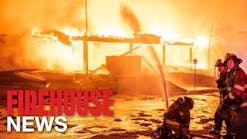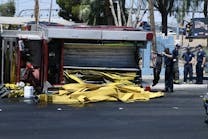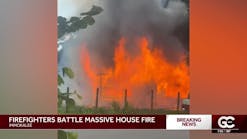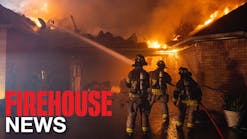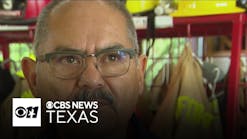NEW ULM -- One of the tasks assigned to Paul Macho when he officially becomes the New Ulm Fire Department's fire chief on Jan. 1 is to draft an alcohol-use response policy, City Manager Brian Gramentz reports.
That portends possibly a shift away from the fire department's plan, broached during the city council's deliberations in which it voted to allow alcoholic beverages to be consumed in the fire halls, that each firefighter would be responsible for determining whether he or she was sober enough to answer a fire call.
That's because the League of Minnesota Cities Insurance Trust's two recommended response policies, one a "zero tolerance," basically sets parameters for determining who will be able to respond to individual fire calls.
For example, the LMCIT's recommended "zero tolerance" policy prevents any firefighter who consumed "any alcohol within an eight-hour period" or used illegal drugs or any prescription or non-prescription medication which has a drowsiness warning from responding to "an emergency incident" or participating in "training or any other Fire Department activity." And, that's based on consuming any alcohol within an eight-hour period prior to the fire call.
The LMCIT recommends the zero tolerance policy for paid fire departments but it admits that a less restrictive policy might be better for many volunteer fire departments so as not to thwart the recruiting of volunteers.
The LMCIT's recommended somewhat less restrictive version prevents "a firefighter who has consumed more than two drinks of alcoholic beverages in the previous four hours" from responding to an emergency call.
Both policies include use of any illegal drugs or medications causing drowsiness or affecting coordination and judgment as reasons for not allowing a firefighter o answer a fire call.
Both policies also require any firefighter "who during an emergency response observes any indication that another firefighter is under the influence of alcohol or drugs" to report that to the fire officer in command.In designing a somewhat more moderate response policy, fire officials do have a viable starting point, the LMCIT says. "The commercial drivers license (CDL) rules, which prohibit a driver from operating a vehicle if she/he has consumed alcohol within the preceding four-hour period, are a reasonable starting point."
(While New Ulm Fire Department volunteers aren't required to have CDLs, a number of them have obtained CDLs on their own, Gramentz says.)
The weight LMCIT's recommendations carry is based upon the structure of the municipalities' liability insurance program. The LMCIT does not insure the cities as a private insurance company would do.
"The Insurance Trust is, in fact, a self-insured pool of Minnesota cities which is to say we are not a typical insurance company. We're an organization that was established by joint powers of all the cities in the state for purposes of self-insuring their own status, liability and workers' compensation risks," LMCIT's Associate Administrator Ann Gergen explained.
"So, we are, in fact, kind of like a cooperative as we are the cities, and our role is to insure city risks and help cities manage their risks both with financial resources which is sort of the insurance-like end of things and also with risk management or loss control resources."
As the individual cities "own" the company, so to speak, that puts LMCIT in the position of advising rather than dictating as a private insurer might do, Gergen acknowledged.
"So, our advice isn't advice coming from an outside insurer. It's advice coming from a recognition of what those cities are doing and what kind of risks it presents. The difference between recommend and strongly recommend is sort of a measure of potential liability, I guess, is one way to think about it."
LMCIT's present recommendations on handling the beer and liquor issues in the fire hall were updated in April 2004, and while not exactly sure, Gergen believes LMCIT has had recommendations on the issue for at least nine to ten years.
While it can only recommend, the LMCIT is unequivocal about cities having a response policy for their fire departments, paid or volunteer.
"Every fire department should have a policy on whether and when a firefighter should respond to a fire call if she/he has been drinking. This is important for several reasons:
"A firefighter who is impaired by alcohol or drugs is a potential danger both to him/herself and to other firefighters.
"An impaired firefighter's actions or poor judgment could result in damage to other persons or property and result in city liability.
"There's a risk of damage to city equipment. (In one LMCIT case, for example, an intoxicated driver totaled a $250,000 fire truck.)
"A firefighter, like any employee, is not entitled to work comp benefits for an injury that was caused by his/her own intoxication."
The LMCIT's risk management memo on beer and liquor issues for fire departments also addresses the response policy's two basic goals which are "to help assure the safety of the firefighters and the public, and the ability of the fire department to do its job; and to give both the firefighters and the department officers clear guidance on what is and isn't permitted, what is expected of each member, and how any questions, issues, or grey areas will be addressed and resolved."
In the October issue of Minnesota Cities, a League of Minnesota Cities publication for its members, Gergen addresses what might be called the domino effect of cities not controlling and minimizing risk.
"When a city's actions create unreasonable risks that other members would have to help pay, additional steps are sometimes necessary. LMCIT starts by working with the city to reduce risks. LMCIT might conduct training, provide legal guidance, revise or draft policies or ordinances, or offer other, appropriate customized services. Often that???s all that is needed," Gergen wrote.
So, if everything goes according to plan in 2008, the City of New Ulm will have taken a step toward minimizing risk within the New Ulm Fire Department with the development of an alcohol use response policy.
Republished with permission from The Journal
Related Links
